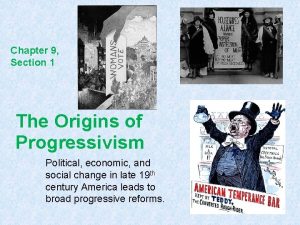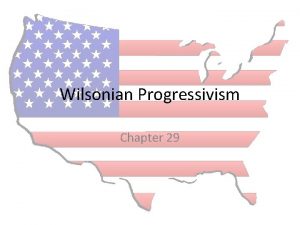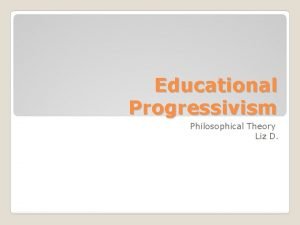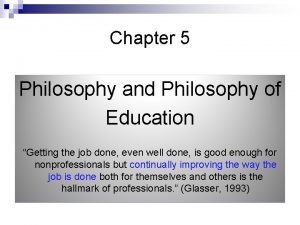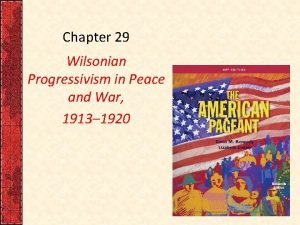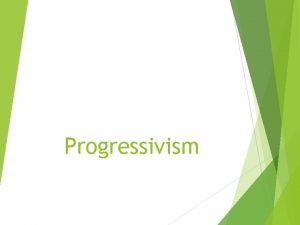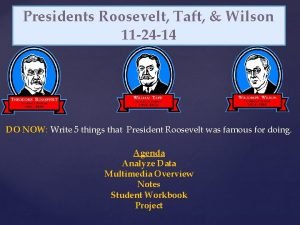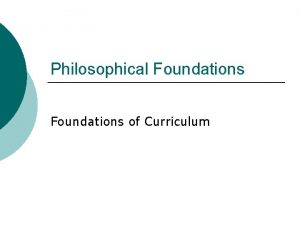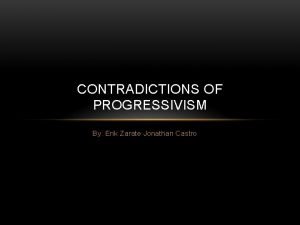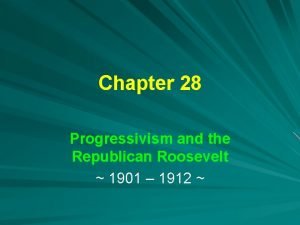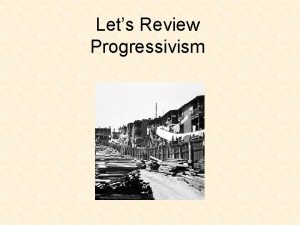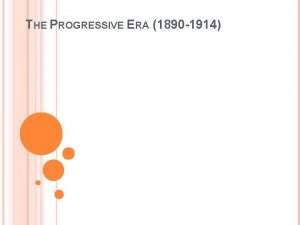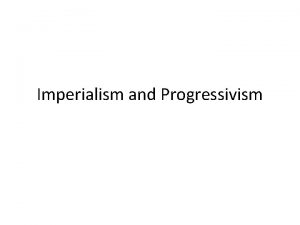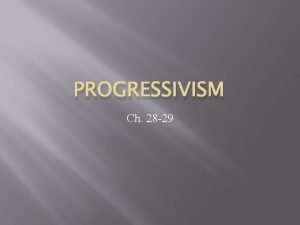Origins of Progressivism Unit 7 1 Origins Quite













- Slides: 13

Origins of Progressivism Unit 7. 1

Origins � Quite a few problems arose with the growth of urbanization and industrialization � Progressives problems: provided the answers to these ◦ Common desire to improve life in the Industrial Age ◦ Shared goals of limiting big business, improving democracy for the people, and strengthening social justice

What is Progressivism? � Part of a reform tradition that dated back many decades ◦ Jeffersonians in the early 1800 s ◦ Jacksonians in the 1830 s ◦ Populists in the 1890 s � Prevailing philosophy of romantic transcendentalism gave way to balanced pragmatism ◦ What’s “good” and “true” could not be known in the abstract but instead, people should take a pragmatic (practical) approach to morals, ideals, and knowledge � Allows Progressives to challenge fixed, traditional notions standing in the way of reform

Who were the Progressives? � Mostly middle-class residents, unlike the rural citizens who led the Populist movement �A business and professional class that took their civic responsibilities seriously ◦ Disturbed about what might happen to American democracy �Unrest among the poor �Excesses of the rich �Government corruption �Overall decline in morality

The Muckrakers � What is a Muckraker? ◦ A writer specializing in a newspaper or magazine story that describes underhanded politics or a sneaky/sketchy person or event in society � First referred to as muckrakers by President Roosevelt � Middle-class stories loved to read about these

The Muckrakers � Magazines: ◦ Mc. Clure’s, Collier’s, and Cosmopolitan were three biggest muckraker magazines from 18851910 �Lincoln Steffens- Tweed Days in St. Louis, 1902 �Ida Tarbell- The History of the Standard Oil Company, 1902

The Muckrakers � Books: ◦ The most popular series of muckraker articles were usually collected and published as books �Exposed the corruptness of local governments/big city politics �Demonstrated the inefficient national government of the Gilded Age �Pointed out downfalls in society � “The law is in everything!”

Decline of Muckraking � Popularity of muckraking journalism began declining after 1910 for several reasons: ◦ Writers found it more and more difficult to top the last sensationalist story ◦ Publishers faced pressure from banks and advertisers to tone down their treatment/perspectives of businesses ◦ Corporations became more aware of their public image Public Relations

Political Reform in Cities � Voter Participation: ◦ On voting day, political parties used to be able to manipulate/intimidate voters ◦ In order to increase public participation in voting, Massachusetts became the first state to adopt a system first tried successfully in Australia �Issued state-printed ballots and had the voter cast their vote in the privacy of a curtained booth ◦ By 1910, all states were doing this

Political Reform in Cities � Direct Primaries: ◦ Before direct primaries, political bosses got to determine who would be nominated as a party candidate �Today, primary elections are just as significant as the senate/presidential elections that proceed them � Direct Election of U. S. Senators: ◦ Before the Progressive Era, senators were chosen by a legislative majority, not voted in by the people �Nevada (1899) ◦ 17 th Amendment (1913) gave people that responsibility �Required all U. S. senators be elected by popular vote

Political Reform in Cities � Initiative, Referendum, & Recall: ◦ Progressives proposed two methods for getting politicians to obey the “will of the people”: �Initiative: voters compel the legislature to consider a bill �Referendum: allow citizens to vote on a proposed law printed on a ballot ◦ A third method, the recall, enabled voters to remove a corrupt politician from office before their term had expired

Political Reform in Cities � Social Welfare: ◦ Jane Addams and the settlement houses were aiding the fight for the poor ◦ Other reformers lobbied vigorously for the needs of immigrants and the urban poor �Better juvenile courts �Liberalized divorce laws �Safety regulations for tenements and factories �Advocated for a parole system and a reformed prison system

Political Reform in States � Temperance & Prohibition: ◦ Whether or not to shut down saloons and not allow drinking was one major issue state governments had to deal with ◦ Even though saloons were often the neighborhood headquarters of political machines, there wasn’t much Progressive support for prohibition ◦ Rural reformers very much supported prohibition, and by 1915 had persuaded the legislatures of twothirds of the states to prohibit the sale of alcohol
 The origins of progressivism chapter 9 section 1
The origins of progressivism chapter 9 section 1 Unit 7 lesson 4
Unit 7 lesson 4 Wilsonian progressivism
Wilsonian progressivism What is progressivism philosophy
What is progressivism philosophy Theory of progressivism
Theory of progressivism Theodore brameld social reconstructionism
Theodore brameld social reconstructionism Perennialism metaphysics
Perennialism metaphysics Wilsonian progressivism in peace and war
Wilsonian progressivism in peace and war Four goals of progressivism
Four goals of progressivism Progressivism definition
Progressivism definition Comparing progressive presidents roosevelt taft and wilson
Comparing progressive presidents roosevelt taft and wilson Idealism curriculum trends
Idealism curriculum trends Erik zarate
Erik zarate National progressive republican league
National progressive republican league
